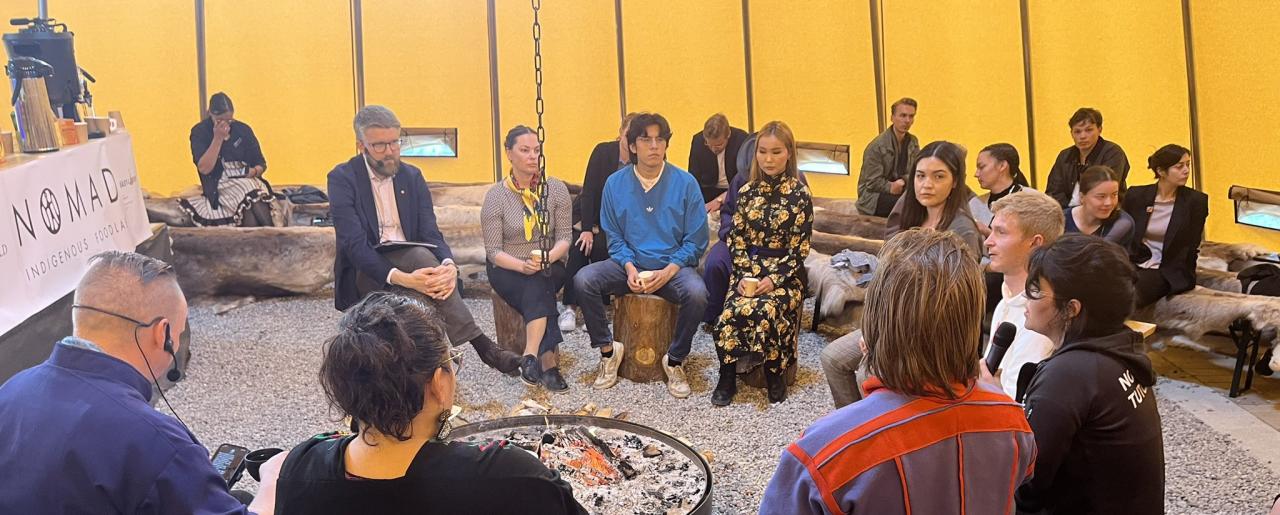Authors: Brittany Janis Melissa Shapiro | Sep. 13, 2023, Belfer Center for Science and International Affairs, Harvard Kennedy School
For an entire week in Arendal, a town on the Southern tip of Norway, a Lavvu stood high on a hill, overlooking the seaside town below. Every year since 2012, the political world of Norway has convened for Arendalsuka, a weeklong celebration of Norwegian democracy known for open-air and open-access discussions between civil society, political parties, and wide-ranging public interest groups. Yet this year, the sight of this Lavvu–a traditional nomadic tent of the Sami people—was far less striking than the sounds emanating from within: empowered voices of Arctic Indigenous youth leaders speaking directly to government officials, civil society, and institutional experts on the need for urgent action to address land conflicts, land degradation, and permafrost thaw across the circumpolar North.
These discussions, held around the Lavvu’s fire, were part of the week-long workshop for Indigenous youth titled, “Exploring Arctic Sustainability: Enhancing Resilience, Addressing Land Degradation, and Permafrost Thaw Through Indigenous Empowerment.” Launched by the International Centre for Reindeer Husbandry (ICR), in collaboration with the Arctic Initiative at Harvard Kennedy School’s Belfer Center and the Permafrost Pathways Project, and with support from the United Nations Global Environment Facility (GEF), the program brought together nearly 20 Indigenous youth from Alaska, Canada, Mongolia, Norway, and Sweden for a week of climate leadership training and dialogue on how a rapidly changing Arctic is detrimentally impacting Indigenous identities, livelihoods, and ways of life.
The workshop included panel discussions such as "Perspectives on Arctic Governance," co-sponsored by the Embassy of Canada to Norway and the Embassy of the United States to Norway, youth-driven policy briefings with the U.S. Ambassador to Norway, and receptions showcasing traditional foods of reindeer herding peoples.
Workshop participants played a pivotal role in this programming, deploying the practical communication skills that had been taught just moments prior in the building adjacent to the Lavvu. Teachers from the International Centre for Reindeer Husbandry (ICR), the Indigenous Peoples’ Secretariat of the Arctic Council, the Arctic Initiative, and Woodwell Climate Research Center facilitated skill-building courses such as video production, policy advocacy, policy communication, participatory mapping, and systems thinking. The tools acquired during these courses helped students to develop refined and succinct issue statements around land use change, conflict, and degradation; to prioritize policy changes; and to devise responsive and actionable solutions.
In just a few days, workshop participants discovered ways to leverage their own personal experiences living in a changing Arctic as a source of political power. Government officials yielded the floor to these young leaders as they shared stories of loss of identity and food insecurity due to declining salmon populations in their traditional fishing grounds in Yellowknife, Canada; their frustrations with policies that prioritize development over respect for their human rights, leading to the fragmentation of their traditional reindeer grazing pastures in Northern Norway and Sweden; the strict conservation policies in Mongolia threatening the Dukha reindeer herders’ livelihoods and nomadic practices; and their fears as news of evacuations from the Northwest Territories due to wildfires displaced their families.
Often, these concerns reflected worsening land degradation and natural disturbances in the Arctic. Infrastructure degradation, shifting animal migration routes, and delayed formation of sea ice, for example, are all symptoms of a changing landscape and thawing permafrost that remains overlooked in most climate dialogues. Speaking to the many leaders in attendance at Arendalsuka, these young individuals eloquently communicated the urgency of not only understanding these challenges but also facing the legacy of colonization and continued trauma of climate change.
Through mapping exercises, storytelling, and systems thinking, workshop participants increasingly found commonality across geopolitical borders and diverse cultural backgrounds. In providing students a platform to discuss what initially seemed like unique challenges and equipping them with leadership and policy tools, this program revealed a universality of experience and the ubiquity of Arctic landscape degradation. Building a shared vocabulary and understanding of these common challenges facing Indigenous communities throughout the Arctic is a prerequisite to enhancing resilience: “This week is about building competence, confidence, and community,” said Anders Oskal, ICR Executive Director.
The workshop in Arendal marked the first in a series of thirteen courses of the GEF-UNEP Reindeer Herding and Resilience project that will harness the traditional knowledge of young Indigenous leaders, spotlight gender diversity, and foster multi-disciplinary partnerships to tackle the compounding challenges of land degradation and permafrost thaw. Reindeer Herding and Resilience is a global project to build a knowledge base of reindeer herders’ knowledge about land and pastures and develop the capacity of reindeer herding youth. It is a part of an international GEF-UNEP partnership for improving the provision of ecosystem services in peatland areas.
Students in this cohort will reconvene for the next phase of their leadership training at the Arctic Innovation Lab during the Arctic Circle Assembly and will finalize their training with an intensive workshop at the Harvard Kennedy School, linked to the Arctic Initiative’s January-term course, "Policy and Social Innovation for the Changing Arctic."
SOURCE: Belfer Center for Science and International Affairs, Harvard Kennedy School
PHOTO: Inside the NOMAD Indigenous FoodLab during Arendal Week 2023, by Brittany Janis
For more information regarding the courses and enrolment, please contact Marina Tonkopeeva at the International Centre for Reindeer Husbandry:



